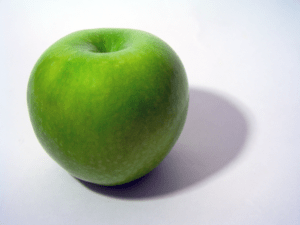The comment period has been extended to December 16. To comment directly, go to http://www.regulations.gov/#!documentDetail;D=APHIS-2012-0025-1938]
By Dan Wheat

PiccoloNamek, Wikimedia
A final, 30-day public comment period on USDA consideration of opening the United States to the growing and sales of genetically modified apples began Nov. 8 and will conclude on Dec. 9.
The USDA’s Animal and Plant Health Inspection Service is seeking public comment on its environmental assessment and plant risk assessment documents for the Arctic Golden Delicious and Arctic Granny Smith apples modified to be nonbrowning by Okanagan Specialty Fruits Inc. of Summerland, B.C.
APHIS will only consider comments on the documents as to whether the apples are likely to pose environmental and plant pest risks, not general comments on genetically modified organisms, said Joel Brooks, marketing and communications specialist at Okanagan Specialty Fruits.
“We’re really excited. After three-and-a-half years, the assessments conclude it is safe and doesn’t pose risks. That’s very satisfying,” said Neal Carter, president of Okanagan Specialty Fruits.
He said he expects approval within 90 days in the United States and only slightly longer in Canada.
“We are closer than ever to bringing consumers and producers safe, value-added Arctic apples, providing greater convenience and reducing food waste,” Carter said.
An orchardist, Carter has been field testing his GMO apples for 10 years. Under USDA permits, trial plots are growing in Washington state and New York, Brooks said.
The apples have been modified not to brown when sliced by switching off a gene. The sliced apple business could save costs of antioxidant treatment to prevent browning and use of sliced apples could increase, Carter has said.
The Washington apple industry remains opposed to USDA approval, not based on science, but because of potential negative reaction to GMO apples in the marketplace, said Chris Schlect, president of the Northwest Horticultural Council in Yakima, Wash.
“We’re not saying it’s unsafe for human consumption. Our concern is the marketplace. We sell apples across the nation and worldwide. There are labeling issues, public perception and testing to prove that something is or isn’t GMO. All of this enters in and major companies like McDonald’s have said they won’t take these,” Schlect said.
Brooks pointed to a Nov. 1 statement by McDonald’s saying it has “no current plans” to use Arctic apples and reviews potential safety and environmental impacts, consumer acceptance and benefits of products as they become available to the market. He noted McDonald’s did not rule out possible future use.
The APHIS environmental and plant pest risk documents are lengthy and technical, Schlect said. Northwest Horticultural Council will review them and decide whether to submit comments, he said.
The council submitted comments during the first U.S. public comment period in 2012. There were a total of 72,745 public comments and the majority were opposed, Schlect said.
Of that, 1,939 were unique comments and the rest were form responses, Brooks noted.
[NOTE: APHIS has posted their Environmental Assessment (EA) and Plant Pest Risk Assessment (PPRA) for Arctic apples, and is requesting public comments on the documents until the December 9, 2013 deadline.]

